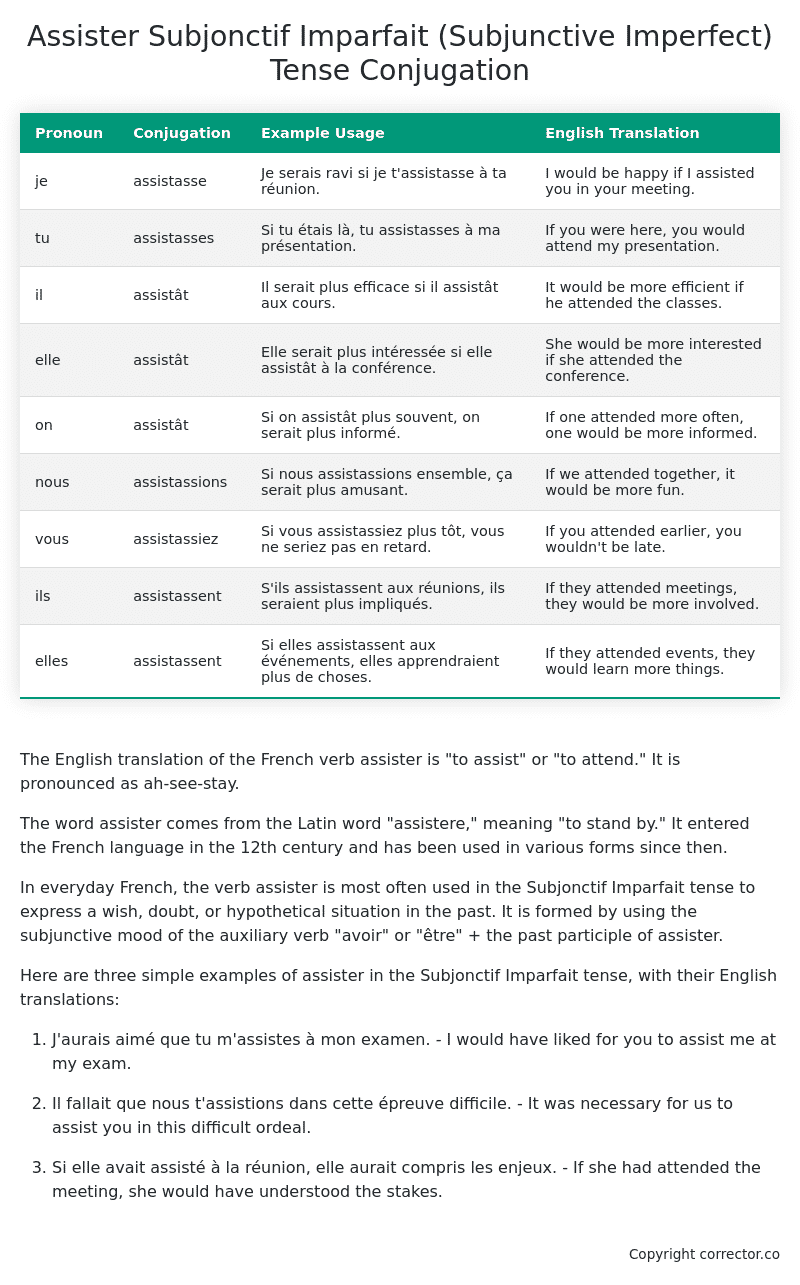Subjonctif Imparfait (Subjunctive Imperfect) Tense Conjugation of the French Verb assister
Introduction to the verb assister
The English translation of the French verb assister is “to assist” or “to attend.” It is pronounced as ah-see-stay.
The word assister comes from the Latin word “assistere,” meaning “to stand by.” It entered the French language in the 12th century and has been used in various forms since then.
In everyday French, the verb assister is most often used in the Subjonctif Imparfait tense to express a wish, doubt, or hypothetical situation in the past. It is formed by using the subjunctive mood of the auxiliary verb “avoir” or “être” + the past participle of assister.
Here are three simple examples of assister in the Subjonctif Imparfait tense, with their English translations:
-
J’aurais aimé que tu m’assistes à mon examen. – I would have liked for you to assist me at my exam.
-
Il fallait que nous t’assistions dans cette épreuve difficile. – It was necessary for us to assist you in this difficult ordeal.
-
Si elle avait assisté à la réunion, elle aurait compris les enjeux. – If she had attended the meeting, she would have understood the stakes.
Table of the Subjonctif Imparfait (Subjunctive Imperfect) Tense Conjugation of assister
| Pronoun | Conjugation | Example Usage | English Translation |
|---|---|---|---|
| je | assistasse | Je serais ravi si je t’assistasse à ta réunion. | I would be happy if I assisted you in your meeting. |
| tu | assistasses | Si tu étais là, tu assistasses à ma présentation. | If you were here, you would attend my presentation. |
| il | assistât | Il serait plus efficace si il assistât aux cours. | It would be more efficient if he attended the classes. |
| elle | assistât | Elle serait plus intéressée si elle assistât à la conférence. | She would be more interested if she attended the conference. |
| on | assistât | Si on assistât plus souvent, on serait plus informé. | If one attended more often, one would be more informed. |
| nous | assistassions | Si nous assistassions ensemble, ça serait plus amusant. | If we attended together, it would be more fun. |
| vous | assistassiez | Si vous assistassiez plus tôt, vous ne seriez pas en retard. | If you attended earlier, you wouldn’t be late. |
| ils | assistassent | S’ils assistassent aux réunions, ils seraient plus impliqués. | If they attended meetings, they would be more involved. |
| elles | assistassent | Si elles assistassent aux événements, elles apprendraient plus de choses. | If they attended events, they would learn more things. |
Other Conjugations for Assister.
Le Present (Present Tense) Conjugation of the French Verb assister
Imparfait (Imperfect) Tense Conjugation of the French Verb assister
Passé Simple (Simple Past) Tense Conjugation of the French Verb assister
Passé Composé (Present Perfect) Tense Conjugation of the French Verb assister
Futur Simple (Simple Future) Tense Conjugation of the French Verb assister
Futur Proche (Near Future) Tense Conjugation of the French Verb assister
Plus-que-parfait (Pluperfect) Tense Conjugation of the French Verb assister
Passé Antérieur (Past Anterior) Tense Conjugation of the French Verb assister
Futur Antérieur (Future Anterior) Tense Conjugation of the French Verb assister
Subjonctif Présent (Subjunctive Present) Tense Conjugation of the French Verb assister
Subjonctif Passé (Subjunctive Past) Tense Conjugation of the French Verb assister
Subjonctif Imparfait (Subjunctive Imperfect) Tense Conjugation of the French Verb assister (this article)
Subjonctif Plus-que-parfait (Subjunctive Pluperfect) Tense Conjugation of the French Verb assister
Conditionnel Présent (Conditional Present) Tense Conjugation of the French Verb assister
Conditionnel Passé (Conditional Past) Tense Conjugation of the French Verb assister
L’impératif Présent (Imperative Present) Tense Conjugation of the French Verb assister
L’infinitif Présent (Infinitive Present) Tense Conjugation of the French Verb assister
Struggling with French verbs or the language in general? Why not use our free French Grammar Checker – no registration required!
Get a FREE Download Study Sheet of this Conjugation 🔥
Simply right click the image below, click “save image” and get your free reference for the assister Subjonctif Imparfait tense conjugation!

Assister – About the French Subjonctif Imparfait (Subjunctive Imperfect) Tense
Formation
Common Everyday Usage Patterns
Interactions with Other Tenses
Subjonctif Présent
Indicatif Passé Composé
Conditional
Conditional Perfect
Summary
I hope you enjoyed this article on the verb assister. Still in a learning mood? Check out another TOTALLY random French verb conjugation!


